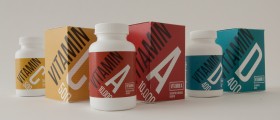
Why Are Vitamins so Important?
Prenatal vitamins are a type of supplements constructed especially for new mothers, which overcome any deficits in the daily diet. The substances that are particularly valuable are calcium, iron, and folic acid. Taking calcium additives helps the mother maintain normal bone density as the baby uses most of it for her own bone and teeth growth. The natural sources of calcium include fish, dairy products, dried fruit, and green vegetables, such as broccoli. Iron is necessary to aid oxygen transfer in the blood for both the mother and the baby. In pregnant women who are anemic or feel chronically exhausted an iron supplement will be advised. Also, many dried fruits and nuts, peanuts, as well as green vegetables with big leaves, and lean meat contain plenty of iron and should be included in the diet. Finally, folic acid is crucial in eliminating the possibility of delivering a baby with a nervous system abnormality. Types of nervous system deficiency include mental retardation, paralysis, and inability to control one’s bowels or bladder. Although about 50 percent of pregnancies are unplanned it should be noted that the nervous system anomalies occur within the first month of pregnancy, when most women are still unaware of the fact that they are pregnant. In case of a planned pregnancy, a medical care provider advises a daily intake of 400 micrograms of folic acid during the period prior to conception as well as 3 months into the pregnancy. In case there is a history of nervous system disorders in the family, or an underlying deficiency of folic acid in the pregnant individual, a medical care professional might advise a different dosage of the folic acid. In case the expecting mother is suffering from diabetes, epilepsy or celiac disease a higher than usual dosage of the folic acid will be recommended. If the pregnancy was not planned a medical care professional will advise the individual to start taking folic acid supplements as soon as she becomes aware of the pregnancy. It is also important for expecting mothers to be aware that there are many natural ways to take the folic acid through, for instance, nuts, beans, cereals, green vegetables with big leaves, brown rice, and citrus fruits. Obtaining the necessary amounts of vitamins and minerals through healthy nutrition and that it is more beneficial than taking dietary supplements, but for many not sufficient. Other than the three main substances, prenatal vitamin supplements should also contain zinc, and vitamins D, C, and E. Vitamin A should be avoided as it can leave adverse consequences on the baby’s development. When it comes to Vitamin D, not more than 10 micrograms should be consumed on a daily basis. The benefits of taking Vitamin D include regulation of phosphate and calcium, which in turn make the teeth and bones grow healthy. Vitamin D can be consumed through foods such as fortified margarines, oily fish, and various types of breakfast cereal. Direct sunlight is the most common way to acquire Vitamin D while enough quantities of it are produced in a shorter period of time than it takes to sunburn. Finally, Vitamin C is necessary to process the iron from foods and is obtained through citrus fruit, juices, peppers, potatoes, tomatoes, and broccoli.
How to Take Care of Pregnancy
Taking of the prenatal supplements ensures healthy development and growth of the fetus as well as improved health of the mother. A medical care professional is a competent guide as to which brands of supplements to choose. In some cases the prenatal vitamins make the individual feel nauseous so the medical care provider should be informed in order to change the prescription. Prenatal vitamins or any kind of dietary supplements should not be taken without a medical care provider’s approval even though they are available without prescription. The prenatal supplements are designed to target various nutritional deficiencies. For instance, there are many which have a higher than usual amount of folic acid, and lower than recommended quantities of iron. If an individual is in good health a medical care professional will recommend a balanced supplement whereas if there are underlying inadequacies, such as anemia, a specialized type of treatment will be issued. It is generally advised that one type of multivitamin should be taken as opposed to numerous separate vitamins and minerals. A doctor recommended prenatal supplement should not be combined with any other additives as there is a risk of an overdose. In some instances where a woman’s diet consists of a variety of foods such as whole grains, fresh fruits and vegetables, and plenty of water there is a possibility prenatal supplements may not be necessary. Any woman who is planning a pregnancy should have an established nutritional and exercise plan commended by a primary health care professional.

















Your thoughts on this
Loading...